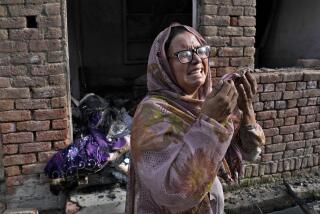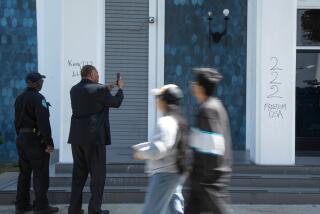Attacks erode Indonesia’s religious freedom
- Share via
SUKABUMI, INDONESIA — The Muslim hard-liners arrived just before midnight armed with stones, clubs and flammable liquid. Townspeople cowering in fear heard chants of “Destroy! Destroy!” and watched the mob set ablaze the mosque of an offshoot Islamic sect that the attackers view as heretical.
“This time they destroyed our property. If they come back, I’m afraid they will target us,” said Rina Nurlinawati, a member of the Ahmadiyah sect who was among witnesses to the burning down of the group’s mosque in Sukabumi, a quiet hillside town on Indonesia’s main island of Java.
The arson was one of several aimed at Ahmadiyah mosques in recent months by an extremist fringe that some Indonesians fear will upset long-held traditions of religious freedom and secularism in the world’s most populous Muslim nation.
The attackers, believed to be followers of the radical Islamic Defenders’ Front, seemed to have been emboldened by a government announcement in April that it might bow to their demands to outlaw the sect, which is accused of putting its 19th century founder on par with the prophet Muhammad.
On June 9, the government issued a decree threatening Ahmadiyah followers with five years’ imprisonment for “activities that are not in accordance with interpretations of the religion of Islam.” It remains unclear how strictly the measure will be enforced, but it didn’t satisfy hard-liners, who still want an outright ban.
The vast majority of Indonesia’s 235 million people are moderate Sunni Muslims. Most view the roughly 200,000 Ahmadis with suspicion, and the government’s move to restrict the sect is widely seen as a bid by President Susilo Bambang Yudhoyono to shore up support among voters for a run for a second term next year.
“Our state is a weak state that doesn’t dare to enforce the law if it goes against the religious feeling of the majority,” said the Rev. Franz Magnis-Suseno, a Jesuit priest and prominent advocate of interfaith relations. “The state has no right to say you may or may not worship.”
Indonesia’s Constitution protects the people’s “right to worship according to their own religion or belief,” though Ahmadiyah opponents argue that the group’s beliefs violate a blasphemy law from the 1960s.
Ahmadiyah came to Indonesia in 1926 from Punjab, a region straddling the Indian-Pakistani border, and has branches in 190 countries. The group, which stresses nonviolence and tolerance of other faiths, is banned in Pakistan and Saudi Arabia.
The Ahmadis identify themselves as Muslims, pray five times a day and follow the teachings of the Koran. But they hail their founder, Mirza Ghulam Ahmad, as a messiah and prophet. That offends Muslims who consider Muhammad the final prophet in a line of dozens of historical figures in the monotheistic religions, including Moses, Abraham and Jesus.
Ahmadiyah first felt the ire of the extremists in 2005, when an influential council of Islamic clerics branded it as “deviant.” The next year, the homes of hundreds of Ahmadis on the eastern island of Lombok were burned. The residents still live in camps today, too afraid to return home.
“We call on Muslims to fight Ahmadiyah, to kill Ahmadiyah. Kill! Kill! Kill!” a leader of the Islamic Defenders’ Front, Sobri Lubis, told hundreds of supporters in a February speech posted on the Internet. “If they refuse to return to mainstream Islam, kill Ahmadiyah. Clear them out of Indonesia. God is great!”
During the April attack in Sukabumi, Nurlinawati said she huddled with her mother in a corner of her home when a mob led by a man in a white robe opened the gates to the mosque compound and stoned their house of prayer and school. The attackers took bamboo furniture off her porch to help fuel the blaze at the mosque, she said, and the wooden building was burned to its concrete base.
Police did not intervene, Nurlinawati said, but non-Ahmadi neighbors managed to persuade the attackers not to destroy her house too.
“We were outnumbered,” said Abdurahman, an Ahmadi in the same village, who, like many Indonesians, goes by one name. “The police didn’t do anything when they burned down the mosque.”
West Java Police Col. Ahmad Dade denied police could have prevented the attack, noting the rioters showed up late at night. A dozen suspects were questioned and have been released pending as-yet unscheduled trials, he said.
He added that Ahmadiyah sites in his jurisdiction are now being guarded by hundreds of officers.
Nonetheless, several Ahmadis in Sukabumi and elsewhere said they might arm themselves for protection.
Police also did not interfere when radicals aligned with the Islamic Defenders’ Front attacked a religious tolerance rally in support of Ahmadiyah on June 1 in Jakarta, the Indonesian capital. Hundreds of demonstrators, including women and children, were gathered at the National Monument, dedicated to Indonesia’s fight for independence, when perpetrators rushed them with bamboo sticks.
“If we had taken action, the riot would have worsened,” said Central Jakarta Police Chief Heru Winarko.
The June 9 decree was signed by Cabinet ministers and the attorney general. Its failure to satisfy conservatives’ demand for a total ban has stoked fears of more unrest. In Sukabumi, some residents have put up stickers identifying their households as non-Ahmadiyah.
Although it’s unclear how the order will play out in the thousands of villages where Ahmadis live, some village Muslim leaders forced the removal of signboards identifying Ahmadiyah mosques, and many Ahmadis are praying at home to avoid confrontation.
Some Ahmadis are seeking political asylum in Australia and have petitioned the United Nations for protection.
Moderate political activists worry that banning the Ahmadiyah would lead to an erosion of the rights of other minorities, such as Christians and Shiite Muslims.
Christians, who make up about 5% of the population, have been attacked by Islamic hard-liners in recent years, and some complain that recent licensing restrictions have made it more difficult to build churches. Some unlicensed churches have been forced to close, while others have been demolished or set ablaze.
“If Ahmadiyah is the first one to be banned, then other minority groups will be the next target,” said Andy Yentriyani of the nongovernmental National Commission on Violence Against Women.
Indonesian converts to Ahmadiyah are often ostracized by family members. Budi Prastyo, 30, who was forced to leave home when he joined the sect, said the debate over the group should not be resolved by politicians or clerics, but by a higher judge.
“Allah will decide whether we are true Muslims or not,” he said.
More to Read
Sign up for Essential California
The most important California stories and recommendations in your inbox every morning.
You may occasionally receive promotional content from the Los Angeles Times.













